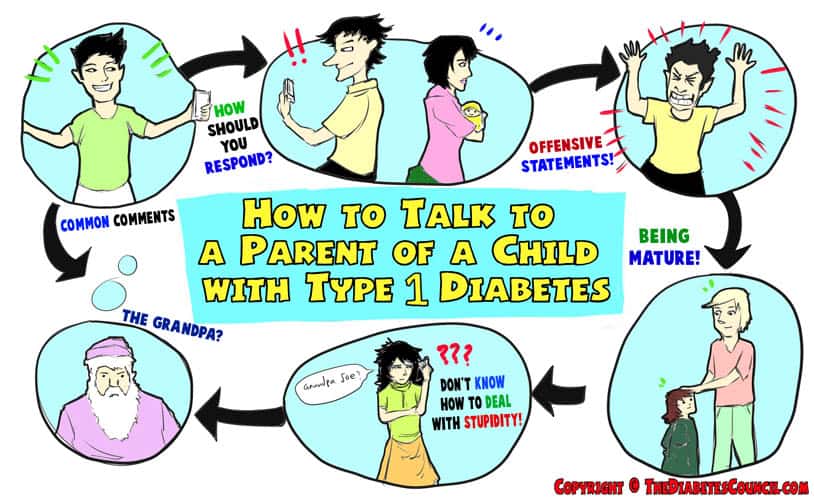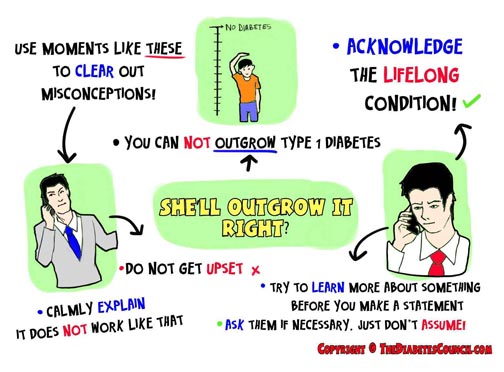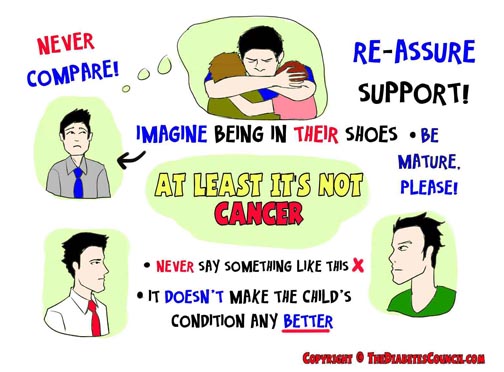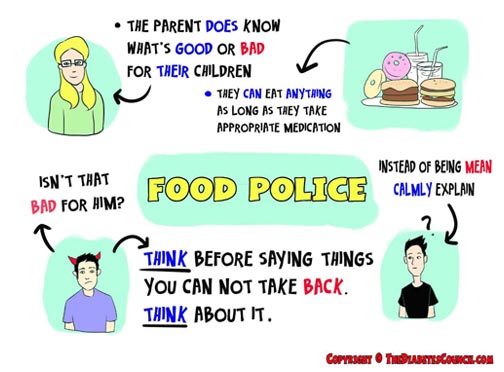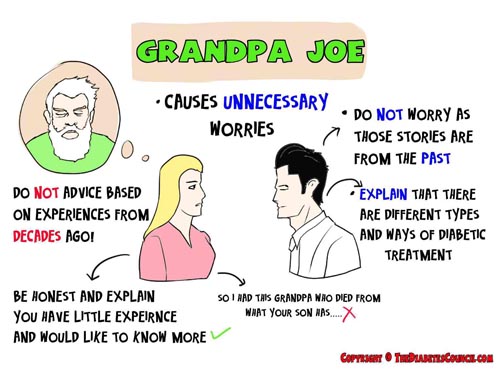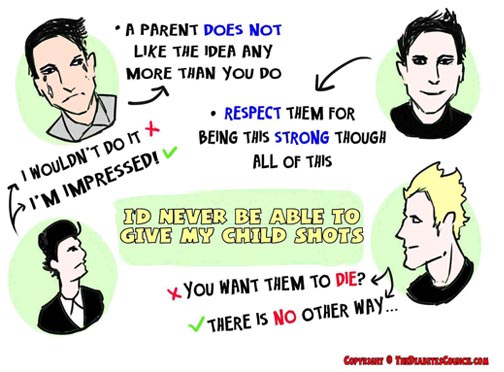Before you had a child with Type 1 diabetes, you never really had to prepare yourself for the conversations that you would have with others. Unfortunately, now that your life has changed, even well-meaning friends and family members may eventually say something that rubs you the wrong way. Believe me, I get it. Parenting a child with Type 1 diabetes is challenging and stressful. We have all the normal behaviors and issues of childhood to deal with, but added to those we have to be a full time 24/7 functioning organ for our children because their pancreas has decided to quit the job.
I’ve heard a lot from a variety of people both close to us and strangers during our almost 7 years of the Type 1 life. While some have rubbed me the wrong way, others just honestly didn’t know any better and were really curious or believed they were helping out. Because of this, I’ve put together a guide on how those who don’t know much about Type 1 diabetes or our diabetic life, can learn how to talk to parents.
This guide will even make a wonderful conversational tool that you can share with friends and family. We know they mean well, but unfortunately, because they do not live this life, they don’t research everything there is to know about our child’s diagnosis, so sometimes they give the wrong advice.
Tip for Parents First
Here’s an important tip that all parents of type 1 kiddos must remember when talking with someone who may have not said the right thing to you. Remember back before your child’s diagnosis, what did you know about Type 1 diabetes? If you’re like me and have more than one child with Type 1, I’m not talking about your 2nd T1, I mean before it entered into your lives, back when your child was able to be carefree and as forgetful as they wanted.
Honestly, I knew NOTHING about Type 1 diabetes and I’m not afraid to admit that. I was familiar with Type 2 and parts of the condition, but Type 1 well as you know it’s a WHOLE new ballgame. I really hope that I never encountered someone with a Type 1 child or someone that had Type 1 and said something I would regret today, but chances are because I didn’t know anything I may have. So my tip to you is to give them the benefit of the doubt, don’t summon your Mama Bear or Papa Bear attitude and jump on them right away. Instead use their mistake as a way to educate and extend advocacy about our life.
I advise reading the following articles:
Common Comments from Well-Meaning People
1. “Hey, that’s NOT too bad, at least it’s not fatal.”
- Why Does This Statement Bother Parents?
Let’s face it T1 parents, we know that this disease CAN very well be fatal. That is why we work so diligently to take care of our children around the clock, sometimes sacrificing sleep to do so. When this statement is made it minimizes the work we do for our kids. It also ignores the fact that diabetes can do major damage to our children’s bodies down the road. We worry constantly about their long-term health.
Type 1 diabetes is a tough disease to try to manage because there are so many variables to it, food, exercise, insulin, checking blood sugar, and more. There is always a risk of them experiencing a low or high blood sugar, no matter how hard we try to manage their diabetes. Both of these can be fatal and life-threatening if they are not treated properly.
- How Should Parents Respond?
Instead of your first instinct to sometimes punch them in the face, let’s try this instead. “I’m really blessed/happy that my child/children are healthy and happy at this moment.”, “However, unfortunately for us, diabetes is so unpredictable, it can cause a life threatening emergency to happen at any time, this is why we work as hard as we do to try and prevent it from happening.”
- Well-Meaning Individual Try This Instead:
“Wow, I know that it can be very challenging to manage diabetes, but I’m very happy for you both that it is treatable, if there is anything I can help you with, please let me know”.
- Why is This a Great Statement?
The acknowledgement of how challenging diabetes is, is one simple thing that anyone can do for type 1 parents. It doesn’t downplay their condition or the work we put in. But also recognizing that it is treatable and offering support can go along way with a parent who is overworked, stressed and never sleeps enough, ever.
2. “She’ll Outgrow It Right?”
- Why Does This Statement Bother Parents?
I usually feel just like Alice when I hear this one for sure. We as parents know that Type 1 diabetes is not something they will outgrow, boy do I wish. It is a lifelong, chronic disease that will never go away, no matter how diligent we are and our children are in managing it as they get older. While this statement isn’t just incorrect, it also is a hint that the symptoms our children experience as a result of their diabetes are only part of a phase they will be able to outgrow, or that once they mature more, they won’t have to worry about this at all. It’s not only frustrating for parents to hear this statement but also very condescending.
- How Should Parents Respond?
Use this as an advocacy opportunity and an educational moment. Instead of your first instinct of telling them “Just like your stupidity, diabetes cannot be outgrown”, let’s try this instead. “Diabetes an autoimmune disease, this means that their pancreas and cells that carry insulin were attacked by their immune system. It is a chronic, and lifelong disease that she will unfortunately not outgrow. We have to ensure we manage it as best we can right now, and that we teach her how to as well because it will follow her throughout her life”.
- Well-Meaning Individual Try This Instead:
“Even when you get used to it as time goes on, I can just only imagine how difficult and challenging it must be to deal with such an unforgiving lifelong condition. If there is ever anything I can help you with, please let me know.”
- Why Is This a Great Statement?
It acknowledges to parents that you realize it’s a lifelong condition, not something they will outgrow next year, and it also lets them know you are there for them as a support system should they need you.
3. “At least it’s not Cancer”
Parent’s, raise your hand if you can count on both hands and probably feet how many times you’ve heard this one!
- Why Does This Statement Bother Parents?
This statement bothers humans in general, not just parents. Cancer and diabetes are both unique diseases each with their own set of challenges. It is a kick in the face to both parents of kids with Type 1 diabetes and parents of kids with Cancer when this statement is made. Downplaying a condition by comparing it to another life-threatening condition should NEVER happen. There is no comparing apples and oranges when it comes to childhood diseases. This statement is a difficult one to swallow because it dismisses both the parents and the child’s feelings of their diabetes. Diabetes is a tough disease, while it doesn’t prevent our kids from doing a vast majority of things, it can sometimes place a real burden on the entire family. It’s unfair all around to compare the two diseases.
- How Should Parents Respond?
Summoning your inner “Oh, no YOU didn’t” answer isn’t the way to go with this one, warranted, yes, but not the right way to respond. Let’s try this instead: “There are many horrible childhood diseases in the world. Diabetes is very challenging. We have to consider all decisions for a 24-hour period and how they will affect our children long-term. Most of the time we are able to manage their diabetes and go about our business, we don’t let it stop our kids or our family from doing anything. However, sometimes it can be really tough”.
- Well-Meaning Individuals Try This Instead:
“Your family does a wonderful job at managing (Insert Child’s name) diabetes. Please know that when you need any help or support, I’m here for you”.
- Why is This a Great Statement?
No other diseases are compared and work put into managing diabetes is not downplayed. You do not dismiss the parent’s concerns, instead you acknowledge they are doing an amazing job and offer support.
4. “He can’t eat that can he?”
- Why This Statement Bothers Parents
Just as parents of kids in general never really like unwarranted advice from others on how to raise their children, parents with type 1 kids don’t want the same in reference to their diabetes. This statement kind of bothers parents because they feel as if you are pointing out that they are not doing a good job in managing their child’s diabetes, whether that is what you meant or not.
- How Should Parents Respond?
“First off, no one made you the food police.” Is how I want to respond. But instead of going that route, smile and try this instead. “Thank you for being concerned about our son, but kids with type 1 diabetes can eat the same foods that other kids without it can. They just have to make sure they take insulin for the number of carbohydrates they consume. A lot of sweets aren’t really good for anyone, but just because they have type 1 diabetes, doesn’t mean they have to avoid any foods.
- Well-Meaning Individuals Try This Instead:
Don’t even comment on any foods their child is eating. You are just opening a door that will be difficult to close if you do.
- Why is This a Great Statement?
Mentioning what a child with type 1 diabetes can and cannot eat to their parents not only shows that you are not familiar with the condition, but it also questions their parenting skills and knowledge of how to manage their child's diabetes.
5. “My Grandpa Joe had diabetes and…….”
- Why This Statement Bothers Parents?
Did your Grandpa Joe have Type 1 or Type 2 diabetes? Was it before the modern treatments we have today? Honestly, the “Grandpa Joe” type of stores usually don’t offer any useful advice or tips, or something that we don’t know already. Even worse, is this statement can cause unnecessary worry or anxiety for parents, especially if their child was just newly diagnosed. It is unfair to compare people’s diabetes because even if they have the same diagnosis, they are still often very different. Parents are looking for support and encouragement, even if the circumstances surrounding the treatments and management of someone else’s diabetes was many years ago.
- How Should Parents Respond?
First, don’t worry that what they said will happen to your child. Respond with “I’m very sorry to hear that your Grandpa Joe also has/had diabetes. Although, I really don’t know him well, there are a few different types of diabetes and the treatments of each have changed so much even in the last few years. We plan on taking the best care of managing my child’s diabetes that we can so they can do everything they want to do in their life.”
- Well-Meaning Individual Try This Instead:
“I only have a tiny bit of experience when it comes to diabetes, because I had a family member with it. But I’d love to learn much more about how you and your child manage their diabetes, whenever you have time. “
- What is This a Great Statement?
You recognize that your family member’s diabetes is not the same as their child and even show willingness to learn more about their child’s management and type of diabetes.
Additional reading material:
6. “I’d never be able to give my child shots”
- Why This Statement Bother Parents?
Whether you meant to or not, this statement comes across to parents that you think they enjoy inflicting pain on their children by giving them multiple shots daily.
- How Should Parents Respond?
“Oh so you’d rather they die?”, yes I know that’s what we’re all thinking when we hear this statement but responding with it might not be the best. Let’s try this one instead: “I don’t like giving my child shots one bit, but I also am willing to do everything I can to keep them alive and healthy, so these shots are absolutely a MUST. It might seem scary to you right now watching us, but believe me if you had to do it, you would, and you’d learn that over time it does get much easier.”
- Well-Meaning Individuals Try This Instead:
“I’m impressed by how much you do to take care of your child’s diabetes.”
- Why is This a Great Statement?
Many parents feel that they could never inflict pain on their children and that these shots are doing just that. Unfortunately, it’s something that is a necessity for Type 1 kids. Instead of claiming you could never do it, recognize that they do a lot of work to keep their children healthy and alive.
References:
TheDiabetesCouncil Article | Reviewed by Dr. Jerry Ramos MD on June 01, 2020


